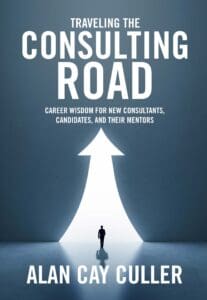Hello Mid-Career Consultants
You know who you are.
n
You decided to become a consultant for a good reason. Maybe you liked business, loved problem-solving and were good at the analytics. Maybe you were freaked out by how much to had to borrow to get the degree that was your ticket to consulting. Maybe everyone in your top of your class cohort joined the consulting club and the discussion was electrifying and you aced the interview case prep.
n
So you interviewed. The interview team was impressed by your volunteer work and, once again, you aced the case they asked you about and loved it. You felt at home. They made an offer to you – one of the very few they offered to anyone at your school. They liked you.
n
Or maybe you were headhunted or sought out a consulting firm after you had worked in industry and had some specific expertise. Your accomplishments were impressive. They liked you.
n
You joined the firm. You worked very hard. You knew there was an u201cup or outu201d policy, (even though itu2019s now called u201cgrow or gou201d by HR) but it never worried you. Even among the other smart, nice, interesting people you work with, managers and partners are impressed with you. You got promoted, maybe even more than once.
n
No one calls you u201cNewbieu201d anymore.
n
You hear yourself referred to as a u201cJourneymanu201d or a u201creal Yeoman.u201d (Maybe you didnu2019t have to look that one up and enjoy the compliment of being called the first medieval farmer who actually owned the land he farmed or carried a longbow and was the backbone of the English Army in the thirteen century.) Even though you hated the term newbie, you hear yourself referring to the newest class that way.
n
Youu2019ve gone from crunching numbers till long after dark, to managing schedules and budgets and supervising the people who crunch numbers till late at night. You are a lot nicer to the newbies than some managers were to you.
n
Now what?
n
If you are asking yourself this question, you have raised your head from the work and are considering (reconsidering) your career.
n
Maybe that is because salary increases have levelled out. Maybe you are looking at the personal relationship challenges from your travel schedule. Or maybe you are feeling that the job has changed and is changing as you rise. Are you managing the work more than doing it? Is there pressure to u201cextendu201d or u201cexpandu201d your project, i.e., sell more work?
n
You have reached a fork in the consulting road.
n
You might have easily missed the earlier u201cdoesnu2019t have u2018right stuffu2019u201d fork. You know the one Iu2019m talking about u2013 the associate that canu2019t estimate how much time a task takes and misses a deadline. Youu2019ve never been the associate who gets too chummy with a junior client and shares a finding before the presentation.
n
If you joined from your undergraduate university you might be up against a bias in some firms, u201creal consultants have graduate degrees,u201d and be considering a return to school. You might even be among the infinitesimal percentage of consultants in the big firms that might be sponsored for a graduate degree.
n
But even so or if you joined from graduate school, suddenly you are faced with choices:
n
- n
- Do you like managing? Mid-career consultants, manage the team, manage the schedule with the client, manage the clientu2019s acceptance of findings. They know when they can manage the u201cbig clientu201d on their own and when they need to u201croll out the partner.u201d
- Can you, do you want to, sell? OK, maybe they never use the word u201csellu201d in your firm. Maybe they use euphemisms like u201cextensionu201d (more work from the same client buying center) or u201cexpansionu201d (additional similar work from another part of the organization). Maybe bringing in new project work is called u201cbusiness developmentu201d or u201cclient development,u201d or maybe there is a quasi-mystical language like u201cweu2019ve been asked to serve,u201d but if youu2019ve gotten this far you know, partnership and the real money in consulting, is reserved for the people who u201cfeed the firm,u201d u201dbring in new business,u201d u201cacquire clients,u201d u201cestablish relationships.u201du00a0 There are two primary sales paths:n
- n
- Rainmaker u2013 direct sales. These partners often maintain excellent relationships with people who currently hire consultants or will shortly rise to that role.
- Thought Leader u2013 indirect sales. These people attract clients with research, published books and speaking or media engagements that turn into service offerings that clients want to buy.
n
n
n
- Do you want to keep the multiplier? Clients pay fees that are two and a half to five times what you are paid. At mid-career, many consultants say to themselves, u201cif I worked for myself I could keep some of that money.u201d At this point some mid-career consultants consider, starting their own firm, or u201cgoing independent.u201d If you are in this group, think carefully. All of the above choices will still apply, all at once, immediately. Ask yourself, who are the clients that will hire me, right now? Next month? Next year or the year after?
- Do you want to stay a consultant? I was a consulting u201clifer.u201d Over almost forty years, I worked for five different consulting firms and worked for myself as a firm founder, independent, and as part of a network of independent consultants. You could say I liked the field. I loved the learning curve associated with a new client or new project. I loved working with smart, nice, interesting people. I loved helping clients change their business for the better. In my Retirement, I still write about the industry. I also recognize that consulting isnu2019t for everyone.
n
n
n
n
n
Mid-career in consulting is a time of choices. Choose wisely.u00a0
n
n
I wrote a book. (Maybe you know that .)
n

n
EBooks are now available in many places. Print is only available on Amazon (for now) but will be coming soon to a bookstore near you.
n
I woule be grateful if you read it. Thanks
“,”tablet”:”
You know who you are.
n
You decided to become a consultant for a good reason. Maybe you liked business, loved problem-solving and were good at the analytics. Maybe you were freaked out by how much to had to borrow to get the degree that was your ticket to consulting. Maybe everyone in your top of your class cohort joined the consulting club and the discussion was electrifying and you aced the interview case prep.
n
So you interviewed. The interview team was impressed by your volunteer work and, once again, you aced the case they asked you about and loved it. You felt at home. They made an offer to you – one of the very few they offered to anyone at your school. They liked you.
n
Or maybe you were headhunted or sought out a consulting firm after you had worked in industry and had some specific expertise. Your accomplishments were impressive. They liked you.
n
You joined the firm. You worked very hard. You knew there was an u201cup or outu201d policy, (even though itu2019s now called u201cgrow or gou201d by HR) but it never worried you. Even among the other smart, nice, interesting people you work with, managers and partners are impressed with you. You got promoted, maybe even more than once.
n
No one calls you u201cNewbieu201d anymore.
n
You hear yourself referred to as a u201cJourneymanu201d or a u201creal Yeoman.u201d (Maybe you didnu2019t have to look that one up and enjoy the compliment of being called the first medieval farmer who actually owned the land he farmed or carried a longbow and was the backbone of the English Army in the thirteen century.) Even though you hated the term newbie, you hear yourself referring to the newest class that way.
n
Youu2019ve gone from crunching numbers till long after dark, to managing schedules and budgets and supervising the people who crunch numbers till late at night. You are a lot nicer to the newbies than some managers were to you.
n
Now what?
n
If you are asking yourself this question, you have raised your head from the work and are considering (reconsidering) your career.
n
Maybe that is because salary increases have levelled out. Maybe you are looking at the personal relationship challenges from your travel schedule. Or maybe you are feeling that the job has changed and is changing as you rise. Are you managing the work more than doing it? Is there pressure to u201cextendu201d or u201cexpandu201d your project, i.e., sell more work?
n
You have reached a fork in the consulting road.
n
You might have easily missed the earlier u201cdoesnu2019t have u2018right stuffu2019u201d fork. You know the one Iu2019m talking about u2013 the associate that canu2019t estimate how much time a task takes and misses a deadline. Youu2019ve never been the associate who gets too chummy with a junior client and shares a finding before the presentation.
n
If you joined from your undergraduate university you might be up against a bias in some firms, u201creal consultants have graduate degrees,u201d and be considering a return to school. You might even be among the infinitesimal percentage of consultants in the big firms that might be sponsored for a graduate degree.
n
But even so or if you joined from graduate school, suddenly you are faced with choices:
n
- n
- Do you like managing? Mid-career consultants, manage the team, manage the schedule with the client, manage the clientu2019s acceptance of findings. They know when they can manage the u201cbig clientu201d on their own and when they need to u201croll out the partner.u201d
- Can you, do you want to, sell? OK, maybe they never use the word u201csellu201d in your firm. Maybe they use euphemisms like u201cextensionu201d (more work from the same client buying center) or u201cexpansionu201d (additional similar work from another part of the organization). Maybe bringing in new project work is called u201cbusiness developmentu201d or u201cclient development,u201d or maybe there is a quasi-mystical language like u201cweu2019ve been asked to serve,u201d but if youu2019ve gotten this far you know, partnership and the real money in consulting, is reserved for the people who u201cfeed the firm,u201d u201dbring in new business,u201d u201cacquire clients,u201d u201cestablish relationships.u201d There are two primary sales paths:n
- n
- Rainmaker u2013 direct sales. These partners often maintain excellent relationships with people who currently hire consultants or will shortly rise to that role.
- Thought Leader u2013 indirect sales. These people attract clients with research, published books and speaking or media engagements that turn into service offerings that clients want to buy.
n
n
n
- Do you want to keep the multiplier? Clients pay fees that are two and a half to five times what you are paid. At mid-career, many consultants say to themselves, u201cif I worked for myself I could keep some of that money.u201d At this point some mid-career consultants consider, starting their own firm, or u201cgoing independent.u201d If you are in this group, think carefully. All of the above choices will still apply, all at once, immediately. Ask yourself, who are the clients that will hire me, right now? Next month? Next year or the year after?
- Do you want to stay a consultant? I was a consulting u201clifer.u201d Over almost forty years, I worked for five different consulting firms and worked for myself as a firm founder, independent, and as part of a network of independent consultants. You could say I liked the field. I loved the learning curve associated with a new client or new project. I loved working with smart, nice, interesting people. I loved helping clients change their business for the better. In my Retirement, I still write about the industry. I also recognize that consulting isnu2019t for everyone.
n
n
n
n
n
Mid-career in consulting is a time of choices. Choose wisely.
n
n
I wrote a book. (Maybe you know that .)
n

n
EBooks are now available in many places. Print is only available on Amazon (for now) but will be coming soon to a bookstore near you.
n
I woule be grateful if you read it. Thanks
n
“}},”slug”:”et_pb_text”}” data-et-multi-view-load-tablet-hidden=”true”>
You know who you are.
You decided to become a consultant for a good reason. Maybe you liked business, loved problem-solving and were good at the analytics. Maybe you were freaked out by how much to had to borrow to get the degree that was your ticket to consulting. Maybe everyone in your top of your class cohort joined the consulting club and the discussion was electrifying and you aced the interview case prep.
So you interviewed. The interview team was impressed by your volunteer work and, once again, you aced the case they asked you about and loved it. You felt at home. They made an offer to you – one of the very few they offered to anyone at your school. They liked you.
Or maybe you were headhunted or sought out a consulting firm after you had worked in industry and had some specific expertise. Your accomplishments were impressive. They liked you.
You joined the firm. You worked very hard. You knew there was an “up or out” policy, (even though it’s now called “grow or go” by HR) but it never worried you. Even among the other smart, nice, interesting people you work with, managers and partners are impressed with you. You got promoted, maybe even more than once.
No one calls you “Newbie” anymore.
You hear yourself referred to as a “Journeyman” or a “real Yeoman.” (Maybe you didn’t have to look that one up and enjoy the compliment of being called the first medieval farmer who actually owned the land he farmed or carried a longbow and was the backbone of the English Army in the thirteen century.) Even though you hated the term newbie, you hear yourself referring to the newest class that way.
You’ve gone from crunching numbers till long after dark, to managing schedules and budgets and supervising the people who crunch numbers till late at night. You are a lot nicer to the newbies than some managers were to you.
Now what?
If you are asking yourself this question, you have raised your head from the work and are considering (reconsidering) your career.
Maybe that is because salary increases have levelled out. Maybe you are looking at the personal relationship challenges from your travel schedule. Or maybe you are feeling that the job has changed and is changing as you rise. Are you managing the work more than doing it? Is there pressure to “extend” or “expand” your project, i.e., sell more work?
You have reached a fork in the consulting road.
You might have easily missed the earlier “doesn’t have ‘right stuff’” fork. You know the one I’m talking about – the associate that can’t estimate how much time a task takes and misses a deadline. You’ve never been the associate who gets too chummy with a junior client and shares a finding before the presentation.
If you joined from your undergraduate university you might be up against a bias in some firms, “real consultants have graduate degrees,” and be considering a return to school. You might even be among the infinitesimal percentage of consultants in the big firms that might be sponsored for a graduate degree.
But even so or if you joined from graduate school, suddenly you are faced with choices:
- Do you like managing? Mid-career consultants, manage the team, manage the schedule with the client, manage the client’s acceptance of findings. They know when they can manage the “big client” on their own and when they need to “roll out the partner.”
- Can you, do you want to, sell? OK, maybe they never use the word “sell” in your firm. Maybe they use euphemisms like “extension” (more work from the same client buying center) or “expansion” (additional similar work from another part of the organization). Maybe bringing in new project work is called “business development” or “client development,” or maybe there is a quasi-mystical language like “we’ve been asked to serve,” but if you’ve gotten this far you know, partnership and the real money in consulting, is reserved for the people who “feed the firm,” ”bring in new business,” “acquire clients,” “establish relationships.” There are two primary sales paths:
- Rainmaker – direct sales. These partners often maintain excellent relationships with people who currently hire consultants or will shortly rise to that role.
- Thought Leader – indirect sales. These people attract clients with research, published books and speaking or media engagements that turn into service offerings that clients want to buy.
- Do you want to keep the multiplier? Clients pay fees that are two and a half to five times what you are paid. At mid-career, many consultants say to themselves, “if I worked for myself I could keep some of that money.” At this point some mid-career consultants consider, starting their own firm, or “going independent.” If you are in this group, think carefully. All of the above choices will still apply, all at once, immediately. Ask yourself, who are the clients that will hire me, right now? Next month? Next year or the year after?
- Do you want to stay a consultant? I was a consulting “lifer.” Over almost forty years, I worked for five different consulting firms and worked for myself as a firm founder, independent, and as part of a network of independent consultants. You could say I liked the field. I loved the learning curve associated with a new client or new project. I loved working with smart, nice, interesting people. I loved helping clients change their business for the better. In my Retirement, I still write about the industry. I also recognize that consulting isn’t for everyone.
Mid-career in consulting is a time of choices. Choose wisely.
I wrote a book. (Maybe you know that .)

EBooks are now available in many places. Print is only available on Amazon (for now) but will be coming soon to a bookstore near you.
I woule be grateful if you read it. Thanks
The post Hello Mid-Career Consultants appeared first on Wisdom from Unusual Places.
Originally Published on https://wisdomfromunusualplaces.com/blog/


























